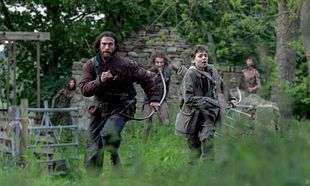Competent but formulaic, 'Dark Waters' only really gets interesting in the third act, and then it ends
Set between the 1950s and 1990s, and based on a New York Times magazine article, ‘Dark Waters’ follows Robert Bilott (Mark Ruffalo), a corporate lawyer from Cincinnati, Ohio, working for law firm Taft Stettinius & Hollister, as he embarks on an environmental lawsuit against one of the world's largest corporations, chemical company DuPont, exposing a long history of pollution and corruption. It all starts when he is approached by farmer Wilbur Tennant (Bill Camp), who believes that something in the water is killing his land and livestock.
‘Dark Waters’ follows a spike in the movie industry of where films are being inspired by magazine articles (last year’s ‘Richard Jewell’, ‘A Beautiful Day in the Neighbourhood’ and ‘Hustlers’ all fit the bill). It is also one of the Oscars bait movies from last year that no one bit, and you can see why. While it is a competent film that is well-acted and directed, with a relevant and intriguing story, you can never shake the cynicism or suspend the obviousness of director Todd Haynes going for that gold statuette.
Haynes has helmed many noteworthy works, including ‘Velvet Goldmine’, ‘Far From Heaven’, ‘I’m Not There’ and, more recently, ‘Carol’. But his tendencies towards melodrama felt like a misstep in ‘Wonderstruck’, and the same can be said for ‘Dark Waters’ which includes such dialogue as “I defend chemical companies”, retorted by “Well now you can defend me” and “The system is rigged. They want us to believe that it'll protect us, but that's a lie.”
It’s loaded with bait-y clichés like the lawyer who goes from being invested in corporations to fighting for the every man, and panning shots of the big corporation (DuPont) compared to the small businesses it pushed out (there are so many drive-by shots, it’s getting ridiculous by the end). You’ve got the making a scene at an important conference dinner sequence, the “you’re risking your whole career for this” speil, the wife who urges her determined husband to tread carefully, culminating in arguments.
Bill Pullman gets an impassioned speech like only Bill Pullman can and Tim Robbins alternates between hardened boss and helpful colleague. Anne Hathaway, meanwhile, though rarely featuring in the first half, shines later on. As for Mark Ruffalo, one feels like he only really comes in to his own in the third act as his character buckles under the pressure of the case. Ultimately he’s playing Mark Ruffalo for most of it. The thing is one gets the sense that ‘Dark Waters’ is trying to be the new ‘Spotlight’, but the sense of a really strong ensemble isn’t there.
One could nitpick, for example, at the scene involving an A4 writing pad which a word or two is written on before a sheet gets flipped and discarded, which is very wasteful and contradictory to the environmental focus of the movie. But really its greatest flaw is that it’s good but too by-the-numbers in some respects, and uneven in others. Act three proves strong and appropriately intense, but what preceded should have been taut. It’s a shame too because there was a strong investigative procedural slash court drama to be had here. It just feels a bit lacklustre, unfortunately.



















































































